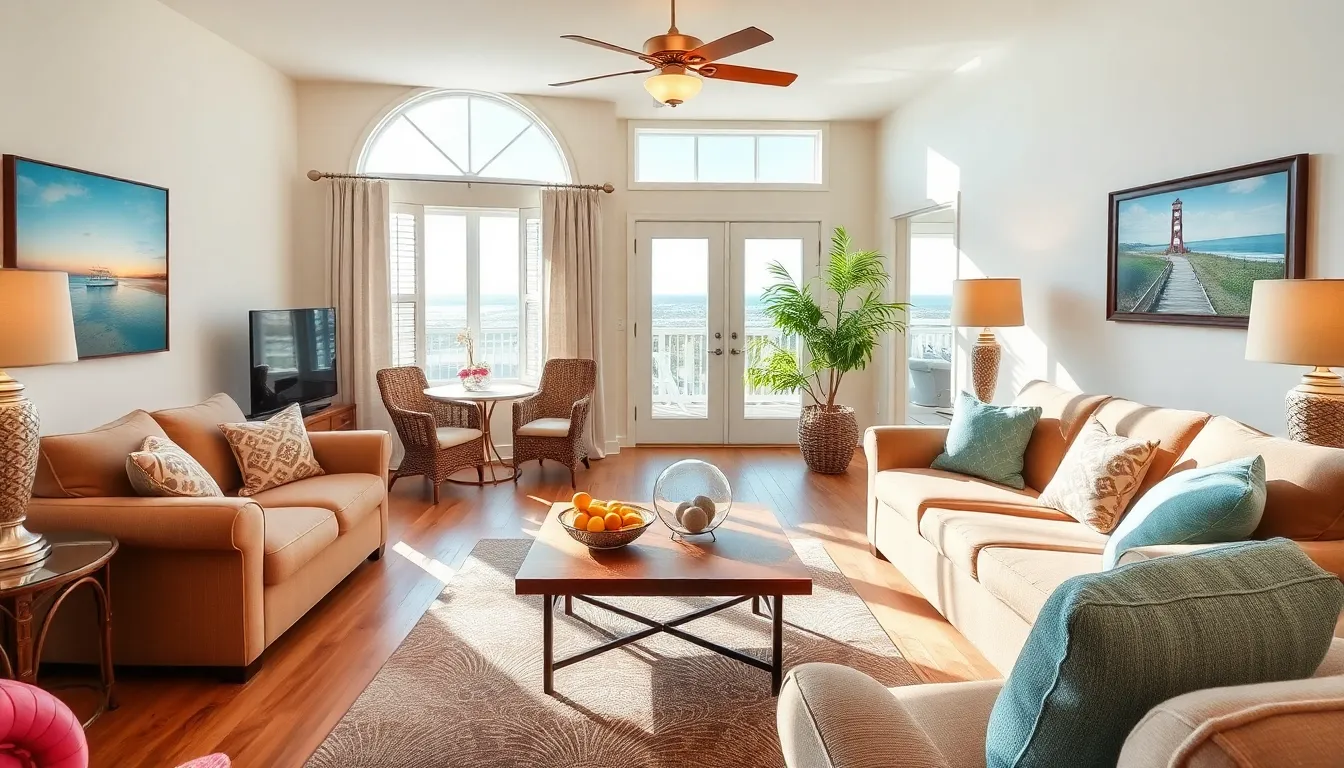Renting out a vacation home can feel like throwing a party and hoping everyone shows up—except this time, you’re charging for entry. With the right approach, it can be a lucrative venture that keeps your wallet happy while giving travelers a cozy place to unwind. But how do you ensure your home doesn’t turn into a scene from a reality show?
Table of Contents
ToggleUnderstand Your Market
Understanding the market is crucial for successfully renting a vacation home. Rental strategies depend on local trends and demographics.
Research Local Demand
Researching local demand provides insights into rental pricing and occupancy rates. Utilize sources like the local tourism board, online rental platforms, and industry reports to gather relevant data. Analyze seasonal trends and special events that attract visitors. For instance, a location near a popular ski resort may see higher demand during winter months. Monitor competitor listings to adjust rates and offerings, ensuring a competitive edge. Keeping abreast of local developments and attractions helps align rental strategies with potential guest interests.
Identify Your Target Audience
Identifying the target audience enables tailored marketing and amenities. Consider factors such as demographics, interests, and travel habits. Families may seek kid-friendly features, while couples might prefer romantic settings. Young professionals often value modern conveniences and proximity to nightlife. Create guest personas using data from previous renters, social media insights, and online reviews. Utilize platforms like Airbnb or VRBO for demographics on similar properties. This knowledge helps prioritize improvements and marketing strategies, ensuring appealing offerings that resonate with specific audience segments.
Prepare Your Vacation Home

Preparing a vacation home for rental involves creating an inviting and functional space for guests. Attention to detail can attract positive reviews and repeat bookings.
Clean and Declutter
Cleanliness significantly impacts guest satisfaction. Thoroughly clean every room, focusing on high-traffic areas like kitchens and bathrooms. Declutter spaces to maximize comfort; remove personal items and excess decorations. Create storage options for guests’ belongings. Ensure linens are fresh, towels are plentiful, and essential supplies, such as toiletries and kitchen items, are stocked. Regularly inspect for maintenance issues, as a well-maintained environment enhances the overall guest experience.
Invest in Quality Amenities
Quality amenities elevate a vacation home’s appeal. Provide comfortable furnishings, including durable sofas, beds with premium mattresses, and inviting outdoor seating. Equip the kitchen with modern appliances and utensils, allowing guests to prepare meals easily. Consider adding entertainment options, like a smart TV, games, or high-speed internet, to enhance leisure time. Additional touches, such as a coffee maker, beach gear, or bicycles, can also attract guests looking for a memorable stay. Prioritize guest comfort and enjoyment through thoughtful amenities.
Set Competitive Pricing
Setting competitive pricing is essential for maximizing occupancy and revenue. Understanding local market dynamics helps establish the right price point.
Evaluate Local Competition
Evaluate local competition by researching similar rental properties. Identify average nightly rates, occupancy rates, and amenities offered. Use online platforms, such as Airbnb and Vrbo, to analyze listings in the area. Compare features such as size, location, and unique offerings. This analysis reveals pricing trends and customer preferences, allowing for informed pricing decisions. Additionally, consider gathering feedback from previous guests to understand perceived value and adjust pricing strategies accordingly.
Consider Seasonal Pricing Adjustments
Consider seasonal pricing adjustments to optimize earnings. Analyze local tourism trends and peak travel seasons to set higher rates during high-demand periods. Implement lower rates in the off-season to attract more guests. Use data from tourism boards and local events to anticipate fluctuations in demand. Establishing minimum and maximum price thresholds for different seasons ensures competitive yet profitable pricing. Adjust prices dynamically based on occupancy and market conditions, maximizing rental income throughout the year.
Create Compelling Listings
Compelling listings attract potential guests by showcasing the best features of a vacation home. Property owners must focus on clear communication and visual appeal to stand out in a competitive market.
Write Engaging Descriptions
Craft descriptive, inviting narratives that highlight unique aspects of the property. Mention amenities, local attractions, and distinctive experiences to capture interest. Use language that evokes emotion and paints a vivid picture of the stay. Instead of stating “close to the beach,” say “relax just steps away from pristine sandy shores.” Address potential guests directly and emphasize benefits like “perfect for family gatherings” or “ideal for a romantic getaway.”
Use High-Quality Photos
Include high-quality images that reflect the property’s charm and cleanliness. Use natural lighting to showcase interiors and exteriors effectively. Capture various angles to provide a comprehensive view, including living areas, bedrooms, and outdoor spaces. Highlight unique features, such as pools, gardens, or scenic views. Ensure images are properly edited and of high resolution to maintain professionalism. Using professional photography can significantly enhance the visual appeal of the listing, making it more enticing for potential renters.
Manage Bookings and Communication
Efficient management of bookings and communication enhances the overall rental experience for property owners and guests.
Utilize Online Booking Platforms
Utilizing online booking platforms simplifies the reservation process. These platforms provide visibility to a wider audience, maximizing the chances of securing bookings. Popular options include Airbnb, Vrbo, and Booking.com. Property owners can set specific policies, such as minimum stay requirements and cancellation terms, directly on these platforms. Listings on multiple sites broaden exposure, while automated tools streamline booking management by syncing calendars to avoid double bookings. Utilizing user-friendly interfaces fosters ease of use for both owners and guests, facilitating prompt confirmations and inquiries.
Establish Clear Communication Channels
Establishing clear communication channels promotes transparency and trust. Property owners should provide contact information through listings for guests to reach out easily. Prompt responses to inquiries enhance guest confidence and satisfaction. Using messaging features on booking platforms ensures all communications are documented and accessible. Detailed welcome messages containing check-in procedures, contact details, and local recommendations improve the guest experience. Encouraging feedback post-stay allows owners to address concerns and make necessary improvements, fostering positive relationships with guests and encouraging repeat bookings.
Maintain Positive Guest Experiences
Creating a positive guest experience increases the likelihood of repeat bookings and enhances overall satisfaction. By focusing on personalized touches and streamlined processes, property owners can greatly improve a guest’s stay.
Provide Local Recommendations
Providing local recommendations fosters an enjoyable experience for guests. Property owners can compile a curated list of nearby attractions, restaurants, and activities, catering to different interests. Recommending popular local restaurants, hidden gems, or family-friendly attractions encourages guests to explore the area. Suggesting seasonal events or festivals can make their visit even more memorable. Providing a mix of recommendations helps guests feel connected and enhances their stay.
Ensure a Smooth Check-In Process
Ensuring a smooth check-in process contributes significantly to a positive guest experience. Property owners can opt for keyless entry systems or lockboxes to simplify access. Clear check-in instructions, including arrival times and contact information, can minimize confusion. Providing a friendly welcome message adds a personal touch and helps guests feel at home immediately. Addressing any concerns promptly demonstrates commitment to guest satisfaction and enhances their comfort throughout their stay.
Renting a vacation home can be a rewarding venture when approached with the right strategies. By understanding the local market and tailoring offerings to meet guest preferences, property owners can enhance their rental appeal.
Creating an inviting space with quality amenities and maintaining cleanliness are crucial for attracting and retaining guests. Competitive pricing and effective marketing can further optimize occupancy rates and revenue.
Efficient management of bookings and communication fosters trust and satisfaction, encouraging repeat visits. By focusing on these key elements, property owners can create memorable experiences that not only delight guests but also contribute to a successful rental business.





